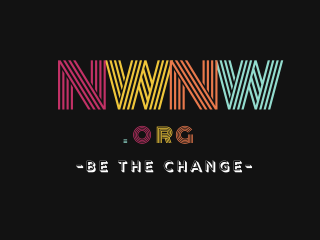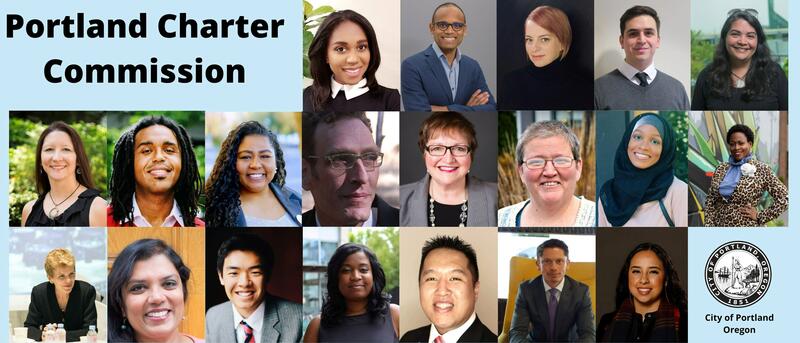What’s the Portland Charter Commission?
Portland’s Charter is a foundational document that shapes how our government works. Since Oregon’s cities and counties have the power to govern themselves through their own charters—as long as they do not conflict with state or federal law—our charter is like our constitution. The City Charter defines the powers of the City and the roles and responsibilities of publically elected officials; it also covers how taxes are levied, how infrastructure and public utilities are managed and improved, public safety, elections, and how the city is run.
At least once every 10 years, the City Council appoints 20 Portlanders to an independent and self-directed committee—the Charter Commission—to review the City Charter over the course of 2 years. These 20 Portlanders reflect a wide diversity of professions, identities, experiences, and combine their shared knowledge and understanding to recommend amendments to the Charter. The Commission works to engage the community in a conversation about Portland’s Charter and how it can best serve the community so that the changes they recommend reflect our needs and opinions.
Want to learn about the Charter in a different format? Check out this comic from Oregon Humanities.
Public Hearings on Proposal to Reform our elections & form of government
On March 31, 2022, the Charter Commission preliminarily agreed on a package of reforms to advance to voters. All 20 Charter Commission members supported the package, which would recommend three major changes:
- Allowing voters to rank candidates in order of their preference, using ranked choice voting
- Four new geographic districts with three members elected to represent each district, expanding the city council to a total of 12 members
- A city council that focuses on setting policy and a mayor elected citywide to run the city’s day-to-day operations, with the help of a professional city administrator

The Commission will release the drafted charter amendment language on May 3, 2022, and then host a series of public hearings for community members to provide input on the proposed amendments. The Charter Commission will provide an educational presentation at the beginning of each public hearing on the proposed amendments and upcoming steps in the charter review process. The final amendment package will be voted on in June before official referral to the November ballot. For more information, visit: www.portland.gov/omf/charter-review-commission
Hearing’s information
The Charter Commission wants to hear from Portlanders! Community members will be given 3-minutes to share their thoughts. If you would like to give testimony, we ask that you sign-up in advanced using this FORM.
- Hearing #1: Tuesday, May 10th from 6-9pm (Hybrid, online & in-person)
- Hearing #2: Thursday, May 12th from 6-9pm (Hybrid, online & in-person)
- Hearing #3: Tuesday, May 17th from 6-9pm (Hybrid, online & in-person)
- Hearing #4: Sunday, May 22nd from 12-3pm (in-person)
Interpretation: We will have Spanish, ASL, Somali, Russian, Chinese, and Vietnamese interpretation at our public hearings
Accommodations: If you need a disability, cultural, or other accommodation to fully participate please contact Sofia Alvarez-Castro at Sofia.Alvarez-Castro@portlandoregon.gov or at 503-865-6818
Commission Topics
The Charter Commission is wrapping up Phase I of the process, focused on Form of Government and City Council Elections. Below are some of the considerations that were taken into account while looking at these topics.
Form of Government
Portland is one of the last remaining major cities using a commission-style government where commissioners serve as both councilmembers and as heads of particular city departments (e.g. Commissioner Jo Ann Hardesty oversees the Office of Civic Life). This system has been phased out by all other major US cities, with many citing problems with City Commissioners prioritizing their individual bureaus over the welfare of the city, meeting long-term goals due to regular overturning of bureau management, and matching city bureaus to Commissioner’s strengths and backgrounds. (For a more in-depth look at the pros and cons of the commission system, check out this report from The League of Women Voters of Portland). Discussing potential changes to the way our city government is structured is a priority of the Charter Commission, along with exploring the following:
- What should the roles of the Mayor and City Council be?
- Should we have a City Manager? Who should appoint them?
- How should City bureaus be managed?
- Who should have power to make the laws?
- Who should have the power to carry out the laws?
- Who should be responsible for developing policy?
City Council Elections
Portland currently elects six city officials at-large: the mayor (who also serves as a commissioner), four commissioner seats, and the city auditor (who monitors the efficiency and ethics of city government). Our city officials are currently not district-based (elected from wards representing different geographic areas) but are city-wide. This system has pros and cons: one benefit is that our officials’ constituencies are the entire city, making them responsible for serving all of us rather than just their individual districts. However, this means that there is no guaranteed representation for underserved voices and areas of Portland, and that a well-funded campaign from more privileged communities could sweep all elected seats. Evaluating how city elections work to be more equitable and reflective of the diversity of Portland is priority for the Commission, along with the following:
- Which offices should be elected by the people?
- What should the constituency of city councilors be?
- How many city councilors should there be?
- What form of voting should we use to elect city council members?
- How should we time city council elections?
- How can campaign funds be raised and spent?
Get Involved
Community engagement is essential to making sure that the Charter reflects Portland today. There are plenty of opportunities for Portlanders to communicate their ideas about Charter reform, so get involved and make your voice heard!
Community members will have the opportunity to provide feedback on the proposed package of reforms during a series of public hearings in May, dates are currently being scheduled! The Charter Commission will take its final vote in mid-June to send recommendations directly to the ballot for the Nov. 8, 2022, general election. Whatever recommendations end up on the ballot, the charter can only be changed when Portlanders vote!
There are many ways community members can get involved and give feedback:
Attend a Meeting
All Charter Commission meetings are open to the public via Zoom! Please check out the events section of the website to see upcoming meetings and agendas.
Can’t attend a meeting? All meetings are recorded and can be found here.
Attend a Listening Session
The Charter Commission is planning virtual listening sessions for community members to give feedback on Phase One issues.
Submit Your Comments
Submit written comments through the Commission’s online public comment form or via email to CharterReview2020@portlandoregon.gov with the subject line public comment. Written comments are read by the Commission and taken seriously.
You can sign-up to give verbal public comments at a meeting. Sign-up here to give public comments and check out the events section for upcoming meetings with public comment time.
Invite a Member of the Commission
You can invite a Charter Commission member to come and listen to your community! Reach out to the Charter Commission Engagement and Communications Coordinator Sofia Alvarez-Castro at sofia.alverez-castro@portlandoregon.gov with the topics or demographics you’re most interested in having a conversation about.
Sign-up for email updates
Make sure you sign-up for email updates to receive the latest updates on Charter Review! Sign up here.
Engage with a Community Partner
Community education and engagement partnership with Coalition of Communities of Color. You can read their digital toolkit here to learn more about the process.

